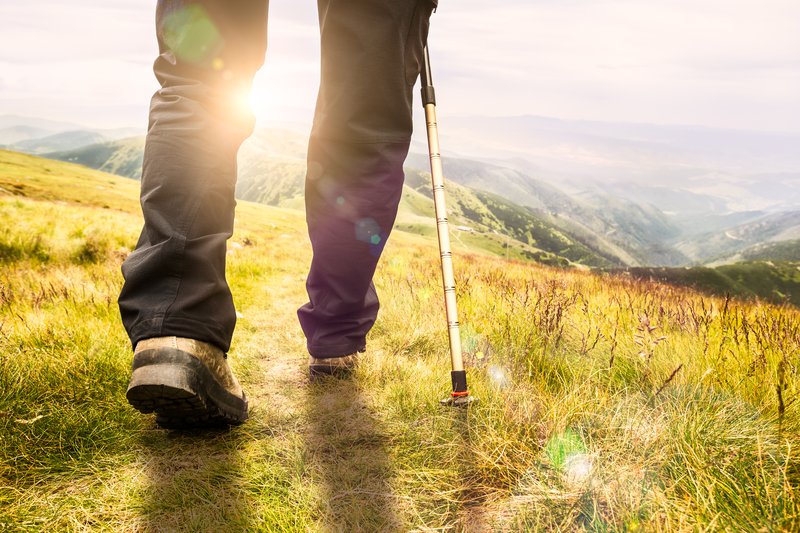The Many Health Benefits of Hiking

The health benefits of hiking are vast, and it’s well worth getting up and getting out to partake in all the fun. Hiking is an activity that’s appropriate for all age groups and can be tailored to just about anyone’s fitness level.
It’s time to draw outside the lines and go off the beaten path to take advantage of all the extras hiking has to offer.
9 Powerful Health Benefits of Hiking
Hiking is more than just your average stroll through the park. Similar to the benefits of walking, hiking packs a punch when it comes to improving your health and maximizing your well-being.
1. Perfect exercise for anyone—since hiking can be enjoyed at any pace and can be tailored to increase or decrease the amount of exertion required, it’s the perfect exercise getaway for virtually any fitness level.
2. Boost your well-being—a study in the United Kingdom purports that spending as little as two hours a week outside and appreciating nature can boost your health and feelings of well-being across the board.
3. Cardiovascular enhancement—hiking not only burns calories, but because of the varied topography and the natural hills and different surfaces, hiking provides an excellent cardiovascular workout. It can even be somewhat of a high-intensity interval workout if you keep up a brisk pace.
4. Better circulation—just getting off the couch and moving through nature will help improve circulation throughout your body. Hiking requires you to use virtually your entire body (arms, legs, and core) thus promoting blood flow throughout.
5. Better creativity—yes, according to scientists, taking a hike can help get the creative juices flowing. Allowing your mind to detach and “roam free” while you traverse the trails can allow for unbridled creativity as thoughts are allowed to flow and the pressures of everyday life fade into the distance. Being in nature allows you the unique ability to focus clearly and come up with ideas you otherwise would not be able to produce in other environments.
6. Natural mood enhancer—according to a 2015 Stanford University study, walking in the great outdoors can boost your mood like no other activity. In fact, there is even a Japanese practice called “shinrin-yoku” or “forest bathing,” also called “forest therapy,” which involves spending time in the woods and experiencing nature with all your senses. This, coupled with the mood-enhancing endorphins that are released when you exercise, provides a potent prescription for happiness.
7. Weight loss—getting in a hike on a regular basis can really have you burning off the calories. You can easily burn between 200 and 500 calories an hour, depending on the difficulty of your course. And, what’s even better, studies show that people who lose weight gradually over time through exercises like hiking are more likely to keep that weight off long term.
8. Stress relief—and this is a big one. According to studies, communing with nature (and the great outdoors in general) has a way of reducing your levels of cortisol (the stress hormone). With so many of us stuck indoors, sitting at desks and dealing with technology all day, every day, getting away from the grind can be just what the doctor ordered. Downplay the stress and anxiety by getting outdoors and hitting the trails.
9. Boost your immune system—interestingly enough, hiking in nature provides health benefits, yes, but the trees themselves even give off essential oils that can help boost your immune system. These health-boosting oils are called phytoncides, and they even have antimicrobial qualities that can help your healthy cells get stronger and enable them to better fight off infection and disease.
What You Need to Know Before Taking a Hike
1. Know your route—pick something appropriate for your level of fitness. Don’t start out on an advanced 10-mile trail with an intense elevation gain if you’re new to hiking or fitness. Think of skiing on the “bunny hill” and chose your trail accordingly. You’ll also want to know where you are going. Bring a map, especially if the trail isn’t well-marked. It can be easy to get lost on an unfamiliar trail, especially if you get off the beaten path.
2. Know the terrain—is the walk going to be hilly, muddy, swampy, or through the woods or over rocks, etc.? You’ll want to have an idea in advance of what’s in store for you in case you need to alter your route or will have challenges along the way.
3. Wear the right shoes—depending upon the terrain you’ll encounter, having the correct type of shoe will be paramount. Hiking boots or trail runners are versatile and should get the job done, but if you don’t have those types, make sure to wear shoes that are comfortable and not slippery, allowing you to get good traction.
4. Wear sunscreen and bug spray—the sun and the bugs could both become more than you bargained for. It’s always better to prepare for both than to find yourself five miles into the hike with your skin being baked and getting attacked by bugs at the same time.
5. Have a first aid kit—sometimes nature strikes back, and it’s just smart to carry a small first aid kit with you, just in case.
6. Cell phone—don’t leave home without it. While it’s not smart to be glued to your phone the entire time you’re hiking (after all, the whole point is to disconnect), you may want to snap some pictures of the gorgeous scenery, or God forbid, you may need to make a call if there is an emergency. (Be aware, however, that the further you get from the beaten track, the less likely you are to have cell service.)
7. Water, water, and more water—don’t forget to hydrate! You may be surprised how thirsty you can get when you are having fun hiking. Having plenty of water on hand (and extra in case of emergencies) is the smart and healthy thing to do.
Health Benefits of Hiking: A Recap
Now, all you need to do is find your path, grab your gear, and head out into the great outdoors. As you escape from the everyday, you’ll be so happy you did AND you’ll enjoy the many health benefits of hiking!



 7 Signs Your Body is Seriously Low on Collagen (not just wrinkles)
7 Signs Your Body is Seriously Low on Collagen (not just wrinkles) Health Expert: "Turmeric Doesn't Work (unless...)"
Health Expert: "Turmeric Doesn't Work (unless...)" 3 Warning Signs Your Probiotic Supplement is a Total Waste
3 Warning Signs Your Probiotic Supplement is a Total Waste

